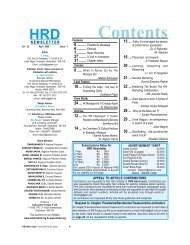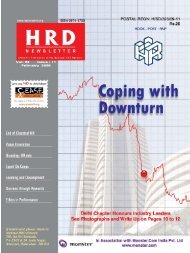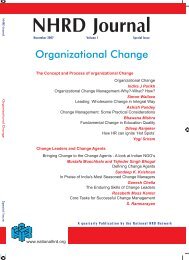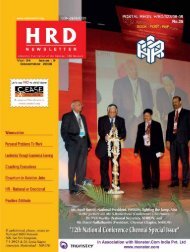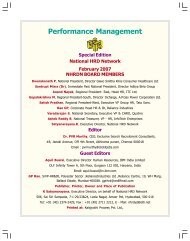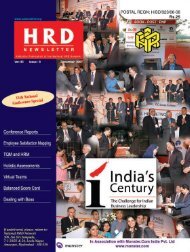5 ........................Chennai Chapter Report 6 ... - National HRD Network
5 ........................Chennai Chapter Report 6 ... - National HRD Network
5 ........................Chennai Chapter Report 6 ... - National HRD Network
Create successful ePaper yourself
Turn your PDF publications into a flip-book with our unique Google optimized e-Paper software.
Ferdinand F. Fournies in his book<br />
Coaching for Work Performance gives<br />
an interesting example where he talks of a<br />
situation wherein a boss 'knights' his<br />
subordinate with the Excalibur and says to<br />
the effect, 'I now pronounce you manager;<br />
go thither and yon and do it", and the<br />
subordinate jumps to his feet and responds<br />
happily saying "Yes, I will go thither and yon<br />
and do it". Then, the author talks about a<br />
similar situation wherein the boss instead<br />
of knighting the subordinate into a manager<br />
says, "I knight you jet pilot; go thither and<br />
yon and do it". Would the subordinate jump<br />
up and willingly respond, or, would he say<br />
something to the effect, "Are you kidding? I<br />
wouldn't know how to start a jet, much less<br />
fly one. And even if I manage to start it, I<br />
would crash somewhere between thither<br />
and yon and kill myself".<br />
When it comes to managerial skills, there<br />
seems to be an underlying belief that a<br />
designation equips a manager with the<br />
requisite skills. A possible moderating factor<br />
could be that the person has been made a<br />
manager because he already 'seemed' to<br />
be playing a role. The crucial missing cog<br />
seems to be in the fact that 'seeming to play<br />
a role' and actually being asked to do it have<br />
very different sets of expectations.<br />
Developing others - A case for<br />
managerial and HR<br />
effectiveness<br />
sense based iterative mode. The less said<br />
of the other not so successful project<br />
managers' operating mechanisms, the<br />
better.<br />
In 'The Leadership Pipeline', Ram Charan<br />
and others call these two transitions as<br />
passages in a career. The interesting thing<br />
being that for each successful transition, the<br />
person needs to un-pack and repack his<br />
baggage in three areas - Work Values, Time<br />
Application and Skills. For example, while<br />
moving from managing self to managing<br />
others, the person needs to move from just<br />
looking at technical efficiency to planning &<br />
delegation, from being a punctual employee<br />
to making time available to subordinates and<br />
priority setting and finally from looking at<br />
spotless contribution technically to getting<br />
results through others and success of direct<br />
reports.<br />
While large companies might invest in<br />
Managerial Development programmes or<br />
even MBAs, it is the other majority which<br />
needs urgent attention. Things might have<br />
worked out in other sectors (am assuming!)<br />
probably because by the time a person<br />
became a manager, he had atleast 14 years<br />
of experience and atleast a kid or two. Thus,<br />
he was probably able to leverage his 'life'<br />
experience at the workplace. How about<br />
those who were in college until 5 years ago<br />
and are now managing others?! And most<br />
importantly, they have absolutely no<br />
exposure to the existence of behavioural<br />
sciences in most cases.<br />
– Naga Siddharth S<br />
From my experiments, a programme which<br />
eases the transition to managing others<br />
needs to be one with a strong appreciation<br />
of the concept of role, clarifying one's own<br />
roles, leveraging role efficacy for performance<br />
management, transactional styles and a<br />
topping of situational leadership. Follow up<br />
workshops every quarter for about two hours<br />
seem to work magic.<br />
However, at the level of the project<br />
managers, a focus on performance<br />
management through in-depth appreciation<br />
of situations, role plays, errors, motivation,<br />
behaviour based goal setting and<br />
performance syndromes works out to be<br />
more apt to help them develop a frame for<br />
thinking, reflecting and relating to their<br />
occupational expectations.<br />
While the most obvious gain from such<br />
exercises is in the realm of managerial<br />
development and organizational performance<br />
and effectiveness, my interest in the same<br />
lies in the fact that developing managers to<br />
manage themselves and their team members<br />
is a stepping stone towards effective<br />
devolution of delegatable areas of people<br />
function to the line, thus allowing for a higher<br />
role for HR in strategy and partnership in<br />
organizational performance. This area is well<br />
explored in a paper "Devolving HR<br />
partnership to the line; Threat, Opportunity<br />
or Partnership" by Susan Whittaker, et.al.(Jan<br />
2003) where the authors observe that while<br />
senior line management is quite ok involving<br />
HR in other-than-routine activities, the junior<br />
line managers' main concern in any such<br />
devolution or partnership is that 'a lack of<br />
support from HR during the delivery of such<br />
service can detract from overall<br />
effectiveness.'<br />
In a typical IT setup, the transition from<br />
Managing Self to Managing others occurs<br />
usually after four years of experience after<br />
a person has joined as a fresher from<br />
engineering. During these four years, the<br />
real 'smart kids' quite intuitively pick up the It is not uncommon to see many a hassled<br />
relevant citizenship behaviours as well as HR manager having his frustration stem<br />
critical success factors which drive from 'why can't the project manager<br />
performance. When made a Lead for a understand such a simple thing' kind of a<br />
group of say five to seven engineers, the theme. It is worthwhile recognizing and<br />
person has his first taste of managing others. appreciating the fact that one cannot expect Being partners in developing others to<br />
This transition is often a turbulent one for a pure techie to become a manager just with manage themselves and others around<br />
many. The next transition occurs when the a change in designation and no formal them is a de-risked strategy towards higher<br />
lead is promoted to a Project Manager after competency building (be it through an MBA partnership and devolution of the People<br />
around three or four years. At this point in or something similar) in the ways of people function to the line. For me, it often seems<br />
time, he moves to the next level of Managing management. This has more serious that much like the concept of Power<br />
Managers. It is worthwhile remembering that implications when such managers grow to Enhancers, HR can achieve success in<br />
a majority of such successful project senior positions in an organisation and are doing what they should be doing only when<br />
managers have grown in 'designation' over gawky or plain defensive and skeptical while they can stop doing what they are presently<br />
time and are basically core engineers and grappling with issues such as visioning and doing! And what better way to do this than<br />
often run their people factories on a common forecasting or for that matter, restructuring. by developing others? H<br />
The author is a <strong>HRD</strong> professional in a large Indian Technology MNC. E-mail: naga.siddharth@gmail.com<br />
| <strong>HRD</strong> News Letter | April 2008, Vol.24, Issue:1 25




